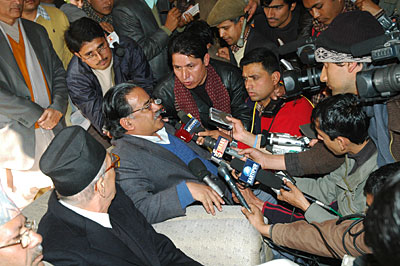Fall From Grace for £1,000
Originally Published on The Kathmandu Post | A minister spends a weekend at the luxury Ritz Hotel in Paris; the £1,000 bill is paid for by his businessman friend; that is against the ministerial code of conduct; a leading daily newspaper exposes this; the minister tries to cover the truth and takes legal action against the paper; goes on lying until it becomes impossible to sustain it; finally admits perjury and is sentenced to jail in utter disgrace and is left penniless.
This is in brief the story of a man once deemed by many as a prime minister-in-the-making in Britain. Jonathan Aitken, a 56 year-old politician with a brilliant background and a bright future, ironically travelled to prison in the company of convicted murderers in a security van recently (June 8) instead of No 10 Downing Street, the British prime minister’s official residence. He will be spending 18 months in prison for perjury and conspiracy to pervert the course of justice. Legal experts say he got off lightly for an offence that is often regarded as one of the most serious in the criminal spectrum.
This writer is not bringing up this matter in an attempt to compare one of the most sophisticated legal and political systems in the world with that of Nepal. It is just an attempt to show how seriously rules, regulations and moral codes have to be taken if a country wants clean governance. Trying to cover up a matter of mere £1,000 (around 112,000 Nepalese rupees) can result in an influential politician being completely in disgrace and bankrupt. Mr Aitken’s £1.75 million house is being sold and all his belongings, including his wristwatch, have been confiscated to settle his debts.
This is how the rule of law should prevail in a proper democracy and that is how people’s faith is attracted towards a system. The defenders of Nepalese democracy argue that one cannot expect a country like Nepal – poor, backward and ruled under absolute monarchy for three decades – to develop a democratic culture as that of Britain or the United States in less than ten years. They say things are improving and will get better in the years to come.
It may or may not improve – this author is not quite sure. But a thing worth noting here is that if one evolves an idea one needs time to nurture it and for it to mature. That may not be a smooth process. However, the Westminster style of democracy that we have chosen to adopt is not our creation. We have copied a system that has been around for hundreds of years. We have seen its trials and tribulations; we have seen what threatens democracy and what makes it work. It would not be logical to repeat that process. Their experiences are enough for us to learn. And it is a major advantage for a country like Nepal that it can gain tremendously from others’ experiences.
We introduced colour television without watching its black and white initial form; We are enjoying the Internet without experiencing its early problems; anything modern – you name it, we have just been its consumer but have had no part in its creation or development. The same applies to democracy. But the difference is: we need money to introduce and maintain modern amenities while democracy is not a development project that requires donor agencies’ support for its implementation. The rule of law is enough for its survival and that comes out of the commitment and sincerity of the leadership.
Therefore, the problem with Nepalese democracy is not that it is in a fledgling state. The problem is that a majority of the leaders lack commitment and sincerity and they abuse the rule of law. If there are flaws in the formation of laws or any other problem in adopting the new system to suit the local context, that is excusable. For that we certainly need time. But if someone thinks we need time to learn not to be corrupt and immoral, he needs to think twice. Present and past events are enough to determine the fundamental moral codes for any individual.
However, the overwhelming majority of Nepalese leaders seem to have failed to learn both from the past and the present. The people seem to have matured as seen in the recently-held general elections but the so-called saint politician Mr Krishna Prasad Bhattarai rebuffed the people’s judgement by inducting some of the most corrupt faces of Nepalese politics into his cabinet. He is relatively a better-read politician in the local context and he should have realised that democracy always descends into danger when government is run by immoral people.
Our politicians have mostly failed to do what they could have done by themselves for the betterment of the country. They have rather sought excuses for their failures by blaming others – opposition politicians, external forces or donor agencies. A survey conducted by a Nepali fortnightly newsmagazine just before the elections showed that people considered the activities of politicians as the major threat to democracy in Nepal and this writer fully agrees with that conclusion. If things are not happening because of reasons beyond the control of politicians, it is the duty of the people to be sympathetic and supportive towards them. But if things are deteriorating or not improving because of the politicians themselves, it is also the duty of the people to put pressure on them by any legal means possible. Only coming out in the street to serve the vested interests of political parties will not be enough to have a clean governance in the country.
Nepal seems to have just copied the cover of Westminster style of democracy. A majority of its leaders have deliberately avoided adopting the essence of the system because at heart they do not want the rule of law to govern the country. If they allow that to happen they are sure to face Jonathan Aitken’s fate. And the tragedy is that unless the likes of Jonathan Aitken are purged, punished, disgraced and are left bankrupt, the system will never improve.
You can read more of Mishra’s column-essays on his three books, Raajnitisangai Raajkaaj, Khana Pugos Dina Pugos and Bhumadhyarekha. Please go to the BOOKS section to find out more about the books and where to purchase them.



